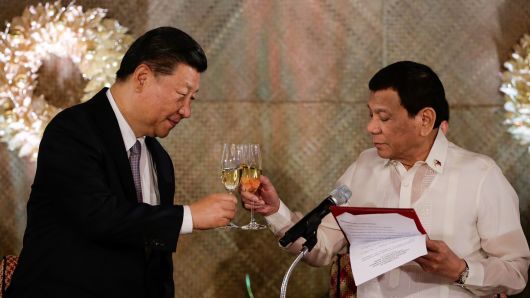The Philippines' pivot toward China has yet to pay off, as Manila awaits promised funds
27 November, 2018

Chinese President Xi Jinping (L) and Philippines' President Rodrigo Duterte (R) raise a toast during a state banquet at the Malacanang Presidential Palace in Manila on November 20, 2018.
Two years since Philippine President Rodrigo Duterte began warming up to China in exchange for promised investments, Manila is still waiting for the financing.
In 2016, Duterte secured $24 billion in investment, credit and loan pledges from Chinese President Xi Jinping's government to upgrade his country's infrastructure. But Xi's government has yet to deliver.
To date, Beijing has promised Manila 10 big-ticket infrastructure projects but only one has moved toward implementation, political scientist Richard Heydarian told CNBC. In the meantime, Duterte has been "soft peddling on the South China Sea disputes and towing the Chinese line," he said.
China and the Philippines have contesting territorial claims in the South China Sea, an international waterway that Beijing largely claims as its own despite nearly unanimous diplomatic opinion to the contrary.
Former Philippine President Benigno Aquino launched a formal case against China over the matter and in 2016, the Hague tribunal ruled in favor of Manila, invalidating Beijing's claims. Chinese officials, however, dismissed that ruling. Critics say Duterte has not done enough to demand China's compliance on the issue.
A few months after the court's decision, the Philippine leader made a dramatic about-turn on foreign policy in declaring a separation from Manila's historic ally, the United States — choosing instead to align with Beijing. Duterte's alliance with the Communist country has angered many Filipinos who accuse him of making geopolitical concessions in the South China Sea for Chinese capital that has yet to materialize.
Nearly half of Duterte's proposed 75 infrastructure projects — the pillar of his $180 billion "Build, Build, Build" economic strategy — were earmarked for Chinese funds but financing has only come through for three ventures, according to Reuters.
Philippine Budget Secretary Benjamin Diokno on Monday publicly acknowledged the slow pace of Chinese investment.
The Philippine president continues to enjoy widespread support, but polls reveal public reservations about his China stance. More than 80 percent of Filipinos felt their country should oppose Beijing's militarization of its man-made islands in the South China Sea, according to a Monday survey from research institute Social Weather Station.
Where's the money?
During Xi's visit to the Philippine capital this week, the two nations signed 29 agreements on a variety of areas such as education cooperation and industrial park development. But upon closer examination of the deals, "much is yet to be desired," said Heydarian. The bulk of those agreements were just memorandums of understanding and vague frameworks, he said: "Very few of them have anything to do with major implementation of infrastructure projects."
"President Duterte is in a weak position against China and he put himself there." -Malcolm Cook, senior fellow at the ISEAS-Yusof Ishak Institute
In a statement on Wednesday, Philippine Vice President Leni Robredo said the bilateral friendship "should not come at the expense of the interests of our people and our nation." The Philippines' sovereignty "must not be compromised in any agreement we enter into with any country," she added.
During Xi's trip, the two leaders pledged to manage contentious issues in the South China Sea but it's not clear whether Duterte pressed the Chinese president on the 2016 court ruling. The two countries also signed a pact to jointly explore oil and gas developmentin the disputed waterway even though the ruling stipulates that Beijing has no sovereign rights to the area.
"President Duterte is in a weak position against China and he put himself there," said Malcolm Cook, senior fellow at the ISEAS-Yusof Ishak Institute, a Singapore think tank. "He embraced closer relations with China so quickly and so fully after coming to power that he gave them what they wanted before China had to reciprocate, so it is not a surprise that China's promised economic benefits to the Philippines are fewer and slower than promised."
There could be several reasons for the delay in Chinese funding for Philippine infrastructure projects.
Projects like the Mindanao Railway — part of the Belt and Road Initiative — are more political than commercial, which means Chinese banks may be hesitant to commit to funding, Cook said: "The Belt and Road Initiative has saddled many Chinese lenders with many questionable infrastructure loans on their books."
Alternatively, Beijing may not feel pressed to speed up investments when it's already getting the concessions it needs from Manila, Heydarian stated.
The Southeast Asian nation also counts Japan and the United States as major investors but economists say it needs as much external financing as possible to narrow its massive infrastructure investment gap. That means Manila simply can't afford to ignore Beijing.
TAG(s):
